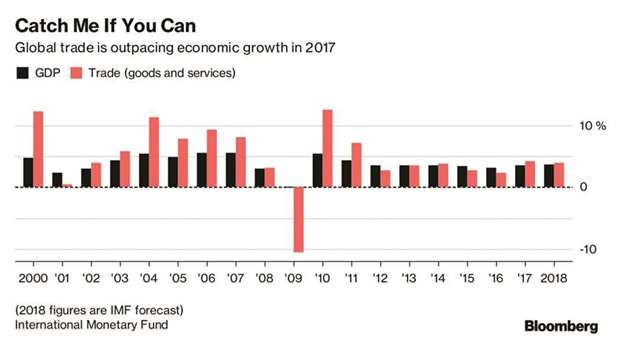Trade ministers will meet in Argentina with one of the traditional defenders of free markets, the US, questioning the benefits of the international rules it helped to forge.
Even though trade volumes are set to grow faster than the world economy this year for the first time since 2014, members of the World Trade Organisation will gather in Buenos Aires concerned about the outlook.
While he hasn’t followed through on many of his threats to rip up trade accords or take on China, Trump is questioning the WTO’s ability to police global commerce. He’s also threatening to walk away from the North American Free Trade Agreement after withdrawing from a 12-nation Asia-Pacific trade pact early this year.
With the US doubting the WTO’s very purpose, it will be difficult for trade ministers to make headway in their meetings on anything but narrow issues such as illegal fishing and agricultural subsidies.
“Without US leadership for a positive agenda, there is a clear risk that energies of WTO members could dissipate across the fragmented set of issues and that few policy proposals will advance to conclusion,” Douglas Lippoldt, chief trade economist at HSBC, said in a research note.
The US played a leading role after the Second World War in negotiating a set of agreements, known as GATT, that committed countries to follow common rules and cut tariffs.
The system formed the basis of the WTO, which was created in 1995 and now referees trade disputes.
At the dawn of the millennium, the WTO was pushing trade talks that would lead to a sweeping reduction in tariffs. Those talks, known as the Doha round, have collapsed. In Buenos Aires, ministers will be seeking progress on less challenging topics, including subsidies.
US Trade Representative Robert Lighthizer has said the WTO isn’t equipped to deal with what his country sees as China’s mercantilist tactics. The US has been blocking appointments to the WTO’s appeals panel, a move the organisation says is undermining its ability to handle disputes.
Late last month, a top Treasury Department official said efforts at global cooperation were hurting the American economy, and called on other countries to join the US in pushing back against China’s failure to transition to a market economy.
At the summit, Lighthizer will push for US interests, including institutional reform at the WTO and fair trade, according to a statement from his office.
“The US is holding the WTO hostage without really stating its demands,” said Caroline Freund, a senior fellow at the Peterson Institute for International Economics in Washington. “It’s dangerous, because the dispute resolution system is one of the parts of the WTO that’s actually working.”
The WTO meeting may reveal how serious the US is in acting on Trump’s tough trade talk, said Douglas Holtz-Eakin, president of the American Action Forum, and former chief economist to the Council of Economic Advisers under George W Bush
“This is a big moment,” said Holtz-Eakin. “This will be the first time Lighthizer sits down with a lot of his counterparts.”
China’s Commerce Minister Zhong Shan, Japanese Trade Minister Hiroshige Seko and European Union Trade Commissioner Cecilia Malmstrom are among those expected to attend the meeting, which runs Dec. 10-13.
Former Argentine Foreign Minister Susana Malcorra, who is chairing the meeting, said her priority is to get member countries to acknowledge that the WTO, in spite of its imperfections, is needed to enable global trade. Any further agreements on specific topics would be an added bonus, she said in an interview.
“If we manage to emerge from this meeting with a pledge for a strengthened system, then that in itself will be a great success,” Malcorra said. “It’s not so long ago that there were people who thought the system was collapsing.”

.
